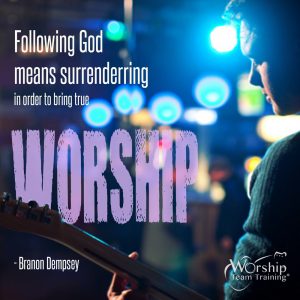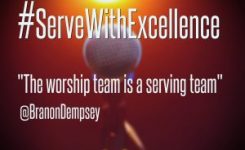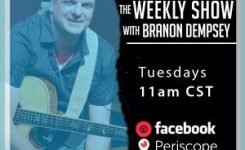Audio, Tech
Louder Isn’t Always Better (Show #17)
 #Audio4One (Video Below)
#Audio4One (Video Below)
As sound engineers, we are tasked with the job of creating space for all the sound coming off of the platform. The goal is to make the instruments and the voices come together to create beautiful sounds that bring people together in worship.
How can we help lead worship from behind the board or tech, that will help connect the congregation to God? The balance is a delicate one.
The difference between noise and music comes down to understanding how to make the music come alive with your mix. “Unless the Lord builds the house, the builders labor in vain. Unless the Lord watches over the city, the guards stand watch in vain.” Psalm 127.1 Many churches often have under-trained or under-experienced tech crews, and that delicate balance is often missed.
For those who are under-trained or inexperienced, Its very common to mistake the loud wall of noise coming off the platform and out of the speakers as acceptable. With a little time and training, you can really make a worship team shine as they bring their best before God to lead the congregation in worship together.
For the worship team, they lead the church in proclaiming Psalm 145:7, which says, “They celebrate your abundant goodness, and joyfully sing of your righteousness.” Here are four ways to help you dial in that delicate balance.
1. The focus should always be on a cleaner mix:
While we, as sound engineers love a loud room, an unclean and un-eq’d mix is just noise. A well eq’d 95db can sound like a dream, and an un-eq’d 85 will sound like a mess. In making a cleaner mix and removing the errant frequencies, it actually allows the opportunity to turn up the overall mix and bring out the right things. Create a pleasing mix before turning up the volume. Working through understanding frequencies would also be a good conversation week to week with one of the great mentors at Worship Team Training.
2. Walk your room:
This gives you the opportunity to understand what your audience is hearing. While their ears may not be as trained as yours, it still presents the chance to sit is their seats and stand in their shoes. Can they hear the vocals? Can they hear the guitar? Does 4k need to be pulled out of the overhead’s on the drums?
Even though you, as the sound engineer, are working, it’s still worship for the people there, and the goal is to make it the best it can possibly be so God can work without distraction. Psalm 150 tells us to “Praise him with cymbals.” If those cymbals sound like a trash can lid, that could easily distract someone Even though you, as the sound engineer, are working, it’s still worship for the people there, and the goal is to make it the best it can possibly be so God can work without distraction. Everyone in that worship service wants to “praise God in His holy house of worship.” (Ps.150.1)
3. Isolate at sound check: One of the best things that can be done during sound check is isolating instruments or voices. Doing this creates the opportunity to find those un-eq’d areas of your mix so when you bring everything back in, everything comes together better, and it’s easier to give everything a place.
4. Get feedback: No, not the ringing stuff. Get feedback from people after worship. They may not be able to point out the 1.2k crunch on a guitar, but they can definitely tell you what they heard and what they didn’t.
Getting feedback from those in worship is also a great way to let them know you care about their worship experience. “If you listen to constructive criticism, you will be at home among the wise.” (Prov.15.31) One of the things I learned during my mentoring semester of training with Kent Morris, is that when you are working the equalization of a room or a mix, to always take away the frequencies you don’t want instead of boosting the frequencies you want to bring out.
By taking away the frequencies you dislike, you are lowering the overall noise in your mix and leaving more space and volume control for the sounds you do want. “Praise our God, all peoples, let the sound of his praise be heard;” Psalm 66.8
[ctt template=”5″ link=”kceVK” via=”no” ]Louder isn’t always better. Be constant in your effort to clean your mix.[/ctt] The Ministry Mentoring Program helped give me the confidence to lead my team and to remember “God doesn’t qualify the called, He qualifies the called.” @ShawnSundsvold @BranonDempsey Shawn completed the Leadership mentoring semester with Worship Team Training. To find our more, please visit our Mentoring page and sign up today with a Mentor. @WorshipTT
 Worship Team Training®
Worship Team Training®
To find out more about Worship Team Training Workshops for your team, University for online courses and Mentoring for your ministry development, visit: www.WorshipTeamTraining.com
Watch & Follow Worship + Music Topics Now on #Periscope www.periscope.tv/WorshipTT
Copyright 2016 Worship Team Training®









